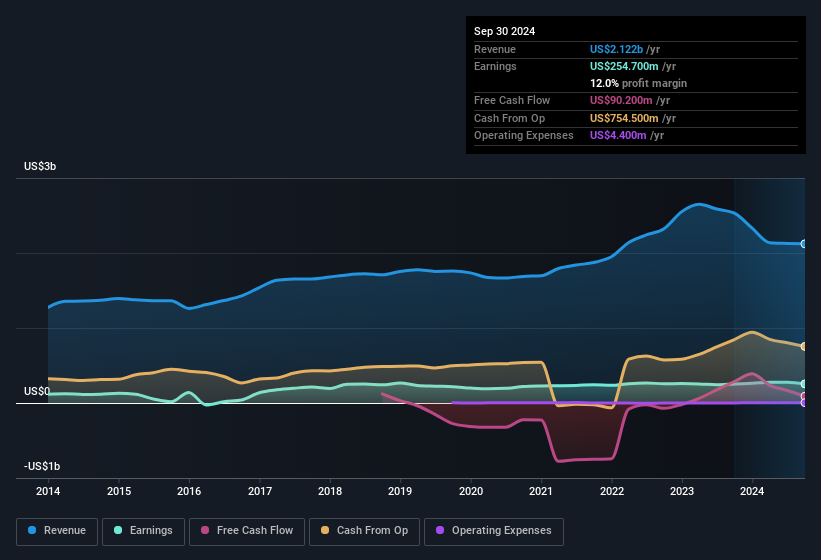- United States
- /
- Other Utilities
- /
- NYSE:BKH
We Think That There Are Some Issues For Black Hills (NYSE:BKH) Beyond Its Promising Earnings
Following the solid earnings report from Black Hills Corporation (NYSE:BKH), the market responded by bidding up the stock price. While the profit numbers were good, our analysis has found some concerning factors that shareholders should be aware of.
See our latest analysis for Black Hills

In order to understand the potential for per share returns, it is essential to consider how much a company is diluting shareholders. As it happens, Black Hills issued 5.3% more new shares over the last year. That means its earnings are split among a greater number of shares. To talk about net income, without noticing earnings per share, is to be distracted by the big numbers while ignoring the smaller numbers that talk to per share value. You can see a chart of Black Hills' EPS by clicking here.
A Look At The Impact Of Black Hills' Dilution On Its Earnings Per Share (EPS)
As you can see above, Black Hills has been growing its net income over the last few years, with an annualized gain of 4.9% over three years. In contrast, earnings per share were actually down by 4.3% per year, in the exact same period. However, net income was pretty flat over the last year with a miniscule decrease. Meanwhile, EPS was actually down a full 3.7% over the period, highlighting just how different the profits look from a per-share perspective. And so, you can see quite clearly that dilution is influencing shareholder earnings.
If Black Hills' EPS can grow over time then that drastically improves the chances of the share price moving in the same direction. But on the other hand, we'd be far less excited to learn profit (but not EPS) was improving. For the ordinary retail shareholder, EPS is a great measure to check your hypothetical "share" of the company's profit.
That might leave you wondering what analysts are forecasting in terms of future profitability. Luckily, you can click here to see an interactive graph depicting future profitability, based on their estimates.
Our Take On Black Hills' Profit Performance
Over the last year Black Hills issued new shares and so, there's a noteworthy divergence between EPS and net income growth. Therefore, it seems possible to us that Black Hills' true underlying earnings power is actually less than its statutory profit. Sadly, its EPS was down over the last twelve months. The goal of this article has been to assess how well we can rely on the statutory earnings to reflect the company's potential, but there is plenty more to consider. With this in mind, we wouldn't consider investing in a stock unless we had a thorough understanding of the risks. For instance, we've identified 3 warning signs for Black Hills (1 doesn't sit too well with us) you should be familiar with.
This note has only looked at a single factor that sheds light on the nature of Black Hills' profit. But there are plenty of other ways to inform your opinion of a company. For example, many people consider a high return on equity as an indication of favorable business economics, while others like to 'follow the money' and search out stocks that insiders are buying. While it might take a little research on your behalf, you may find this free collection of companies boasting high return on equity, or this list of stocks with significant insider holdings to be useful.
Valuation is complex, but we're here to simplify it.
Discover if Black Hills might be undervalued or overvalued with our detailed analysis, featuring fair value estimates, potential risks, dividends, insider trades, and its financial condition.
Access Free AnalysisHave feedback on this article? Concerned about the content? Get in touch with us directly. Alternatively, email editorial-team (at) simplywallst.com.
This article by Simply Wall St is general in nature. We provide commentary based on historical data and analyst forecasts only using an unbiased methodology and our articles are not intended to be financial advice. It does not constitute a recommendation to buy or sell any stock, and does not take account of your objectives, or your financial situation. We aim to bring you long-term focused analysis driven by fundamental data. Note that our analysis may not factor in the latest price-sensitive company announcements or qualitative material. Simply Wall St has no position in any stocks mentioned.
About NYSE:BKH
Black Hills
Through its subsidiaries, operates as an electric and natural gas utility company in the United States.
Established dividend payer and fair value.
Similar Companies
Market Insights
Community Narratives



